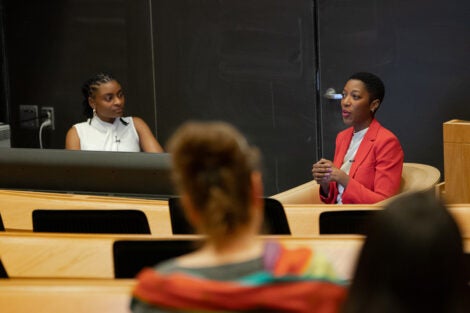April 25, 2024 – Equipping public health leaders with insights and tools to advocate for and implement equitable health practices and policies was the focus of the 2024 Health Equity and Leadership (HEAL) Conference at Harvard T.H. Chan School of Public Health.
The daylong conference, held April 19, featured an array of speakers and interactive workshops. The focus was how diverse social identities—such as race, gender, and socioeconomic status—and systemic inequalities converge to impact public health outcomes and how to achieve innovative solutions.
The event was organized by Harvard Chan School’s Office of Diversity and Inclusion, including Lilu Barbosa, chief diversity, inclusion, and belonging officer, and Jennifer Castro, director of strategic projects and diversity education. Three ODI Equity, Diversity, and Inclusion Fellows—Emnet Sisay, SM ’24, Adrian Medina, MPH ’24, and Lilia Calleros, MPH ’24—were primary coordinators of the conference.
Lucy Lomas, an OB-GYN and expert in women’s health and wellness, was the event’s keynote speaker. Lomas leads a community-owned wellness center in Roxbury and also serves as director of community, health, and wellness for the New England Medical Association, a network of Black physicians.
In a conversation moderated by Symphony Fletcher, an MPH-45 student in quantitative methods, Lomas talked about how, when one of her sisters was pregnant in 2023, she was scared, because she knew that Black women in the U.S. face a disproportionate risk of complications and death during childbirth. Lomas closely supported her sister during childbirth and all went well. But the experience underscored for her that “women need to feel taken care of. And right now a lot of our health care system is Swiss cheese. Things can fall through the cracks. And right now it is our Black women that are falling through the cracks.”
Lomas listed several ways to create healthier and safer situations for women giving birth that could help Black women feel more comfortable. For example, she said, midwives and doulas can help women feel more secure and cared for. So can birthing centers that create home-like experiences. Working to reduce stress faced by healthcare workers could also help, since the better they are supported, the more support they can in turn provide their patients.
Lomas also offered advice for people working to improve health equity. “Having like-minded individuals that you have the opportunity to check in with on a regular basis is crucial, because this work is heavy,” she said. She noted that when you’re working on “how things could or should be, you are challenging yourself. You are challenging your mind. You are challenging your emotions. So make sure you have a way to process that.”
Other topics covered at the conference included:
- Successes and challenges of a student-run free pediatrics clinic for uninsured patients in Nashville, Tennessee
- How health policies can be improved when health care providers and communities work together on solutions
- Advancing a more inclusive blood and transplant system for donors from marginalized groups
- How to promote migrant health and well-being
Photos: Ben Wallace


